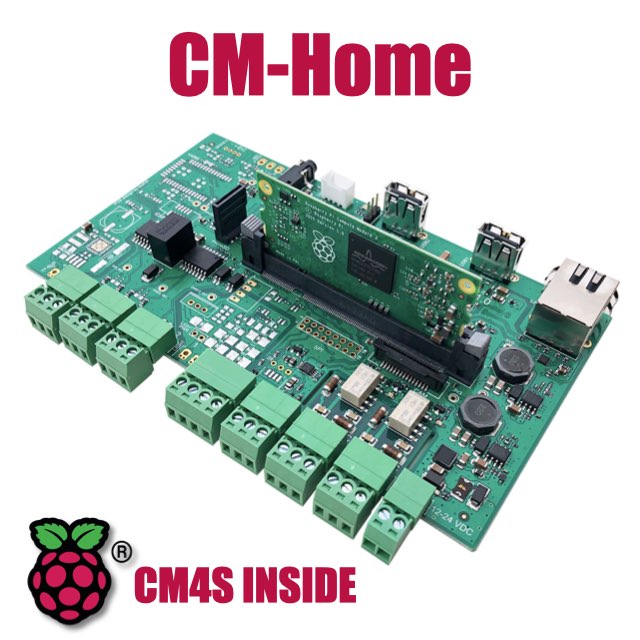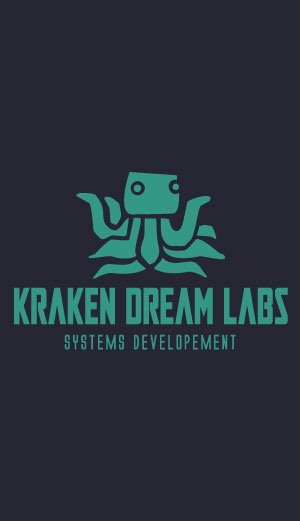CM Panel technical documentation Buy
How to turn on the CM-Panel POE at a certain time
Now two services will be created that will allow you to exchange information between the micro and the CPU on the correct power status and shutdown.
Create Python Script.
New directory app and file goshd.py.
$ mkdir /home/pi/app
$ cd /home/pi/app
$ nano goshd.py
Contens:
!/usr/bin/python
import RPi.GPIO as GPIO
import time
import datetime
import os
O_DISPLAY =22
I_SHD =25
GPIO.setmode(GPIO.BCM)
GPIO.setwarnings(False)
GPIO.setup(I_SHD,GPIO.IN)
GPIO.setup(O_DISPLAY,GPIO.OUT)
while True:
if GPIO.input(I_SHD) == 1:
GPIO.output(O_DISPLAY,GPIO.HIGH) # Display Off
os.system("sudo shutdown -h -P now")
time.sleep(.5)
Set it as executable class='acmetable':
$ chmod +x goshd.py
Create a service by editing this file:
$ sudo nano /etc/systemd/system/goshdn.service
Save on it these contents:
[Unit]
Description=Set Auto shutdown
After=systemd-user-sessions.service
[Service]
ExecStart=/home/pi/app/goshd.py
Restart=on-abort
User=root
WorkingDirectory=/home/pi/app
[Install]
WantedBy=multi-user.target
Then enable the service by typing:
$ sudo systemctl daemon-reload
$ sudo systemctl enable goshdn.service
Create the file cm3start.py with these contents:
!/usr/bin/python
import RPi.GPIO as GPIO
import time
import os
SHDNDONE = 26
GPIO.setmode(GPIO.BCM)
GPIO.setwarnings(False)
GPIO.setup(SHDNDONE,GPIO.OUT)
# On CM3 (Send message OK to Microcontroller )
GPIO.output(SHDNDONE,GPIO.LOW)
# Set register RTC
time.sleep(1)
os.system("sudo i2cset -y -f 1 0x68 0x00 0x58")
time.sleep(1)
os.system("sudo i2cset -y -f 1 0x68 0x0f 0xff")
time.sleep(1)
os.system("sudo hwclock -s")
Set it as executable class='acmetable':
$ chmod +x cm3start.py
Create a systemd file for this service:
$ sudo nano /etc/systemd/system/cm3start.service
with this content:
[Unit]
Description=CPU to microcontroller to start regular operating system
After=systemd-user-sessions.service
[Service]
ExecStart=/home/pi/app/cm3start.py
Restart=on-abort
User=root
WorkingDirectory=/home/pi/app
[Install]
WantedBy=multi-user.target
Then enable the service by typing:
$ sudo systemctl daemon-reload
$ sudo systemctl enable cm3start.service
In the following example, we will make sure that the board can turn on at a fixed time, must be set to MANUAL power-on mode. To do this the same must be switched off (the LED must not flash), hold the P2 button, give power to the board, when the LED will emit a fixed color (manual BLUE or GREEN automatic mode) the button must be released.
This operation will allow you to switch from automatic or manual mode.
Create python script set_alarm.py (Interrupt RTC)
$ sudo raspi-config
Examples:
Set Localisation Options, L2 Timezone, Europe and Rome.
This will be used for example to set the board to switch on at a set time through the Interrupt Real Time Clock chip.
Python Script for setting interrupt, create directory app and file set_alarm.py:
$ mkdir /home/pi/app
$ cd /home/pi/app
$ nano set_alarm.py
Contents:
#!/usr/bin/python
'''
===============================================================================
Description : Set PCF8523 Alarm interrupt - Minute or Time
Board : CM3-Panel V.7 POE - Acme Systems
Autror : Mauro Tocci
Version : 1.1 - October 2019
-------------------------------------------------------------------------------
Use example :
-------------------------------------------------------------------------------
script.py 12:15 M N N
script.py 12:15 T N N
| | |_ Y = Debug enable (Y only screen, no transfer to the chip)
| |
| |___ Y = Sync NTP server
|
|_____ M = Switching on only when the minutes indicate value 15
|_____ T = Start-up time 12:15
-------------------------------------------------------------------------------
Logic sequence:
Time alarm example: 14:30
1. Split time value to array (variable dato[x])
2. Hour calculation (dato[0]) to time UTC
3. Calculation of hexadecimal values to be set on the RTC registers
Hour alarm register (address 0Bh)
Hour
__12__ <--- UTC value
| |
DEC UNIT
7654 3210 Bit registry
0001 0010 Binary
|______|
| <- Concatenate
00010010 BCD to hex convert
|
0x12 Hexadecimal value
|
sudo i2cset -f -y 0x68 0x0b 0x12 Set Hour Alarm registry
Minute alarm register (address 0Ah)
Minute
__30__
| |
DEC UNIT
7654 3210 Bit registry
0011 0000 Binary
|______|
| <- Concatenate
00110000 BCD to hex convert
|
0x30 Hexadecimal value
|
sudo i2cset -f -y 0x68 0x0a 0x30 Set Minute Alarm registry
4. Send final sequence data to RTC
sudo ntpdate ntp1.inrim.it # Example Sync Italian NTP Server (Y)
sudo hwclock -w # Set clock hardware (Y)
sudo i2cset -f -y 0x68 0x00 0x58 # Reset chip PC8523"
sudo i2cset -f -y 0x68 0x00 0x02 # AIE Enable alarm INT1
sudo i2cset -f -y 0x68 0x0f 0xff # INT1 Off - mosfet open drain
sudo i2cset -f -y 0x68 0x0a 0x30 # Set Minute Alarm registry
sudo i2cset -f -y 0x68 0x0b 0x12 # Set Hour Alarm registry
===============================================================================
'''
import os
import sys
import datetime
from datetime import timedelta
#----------------------------------------------------------------------
# Conversion from decimal to binary
#----------------------------------------------------------------------
def bcddigit(sn,dgt):
n = int(sn)
bin_nr = bin(n)[2:]
return (('0' * dgt ) + bin_nr)[-dgt:]
#----------------------------------------------------------------------
# Clear
#----------------------------------------------------------------------
def cls():
os.system('cls' if os.name=='nt' else 'clear')
try:
#----------------------------------------------------------------------
# Variables sets
#----------------------------------------------------------------------
dato = sys.argv[1].split(':') # Array hour
TYP = sys.argv[2] # Type of writing
Sync = sys.argv[3] # Sync to NTP server
Debug = sys.argv[4] # Debug screen print value
#----------------------------------------------------------------------
# Data preparation to be transferred to the chip
#----------------------------------------------------------------------
cls()
delta = 0
ACTH = dato[0] # Hour
ACTM = dato[1] # Minute
# UTC
utc_h = datetime.datetime.utcnow()
# Local time
dat_h = datetime.datetime.now()
# I find the difference between local time and UTC
if ( utc_h < dat_h ):
delta = (int(dat_h.strftime("%H")) - int(utc_h.strftime("%H"))) *-1
#----------------------------------------------------------------------
# UTC Calculate
#----------------------------------------------------------------------
utc_h = datetime.datetime.now().strftime("%Y-%m-%d " + dato[0] + ":" + dato[1])
utc_h = datetime.datetime.strptime(utc_h, '%Y-%m-%d %H:%M')
utc_h = utc_h + timedelta(hours=delta)
dato = utc_h.strftime("%H:%M").split(':') # Calculated time
D = 4
BIN_D = "" # Decimal
BIN_U = "" # Unit
reg_0a = "" # Minute Register
reg_0b = "" # Hour Register
if ( Debug == 'Y' ):
print "==================================================================="
print " List of data entered and register calculation"
print "==================================================================="
print "Time : " + sys.argv[1]
print "Type : " + TYP
print "Sync NTP : " + Sync
print "Calc UTC : " + repr(delta) + " hours compared to Local Time"
if ( TYP == 'T' ):
if ( Debug == 'Y' ):
print ""
print "-----------------"
print " HOURS"
print "-----------------"
print " Value : " + ACTH
print " UTC calculation : " + dato[0]
print ""
print " Ten's place : " + dato[0][:1]
BIN_D = bcddigit(dato[0][:1],D)
if ( Debug == 'Y' ):
print " Binary : " + BIN_D
print " HEX : " + hex(int(BIN_D,2)).replace("0x", "0x0")
print ""
print " Unit place : " + dato[0][1:]
BIN_U = bcddigit(dato[0][1:],D)
if ( Debug == 'Y' ):
print " Binary : " + BIN_U
print " HEX : " + hex(int(BIN_U,2)).replace("0x", "0x0")
print ""
print " Bit registry : 76543210 - AEN_H = 7 (0 = Enable, default 1)"
print " Binary : " + BIN_D + BIN_U
BIN = BIN_D + BIN_U
if ( int(BIN,2) < 16 ):
reg_0b = hex(int(BIN,2)).replace("0x", "0x0")
if ( Debug == 'Y' ):
print " HEX Reg. 0Bh : " + reg_0b
else:
reg_0b = hex(int(BIN,2))
if ( Debug == 'Y' ):
print " HEX Reg. 0Bh : " + reg_0b
if ( Debug == 'Y' ):
print ""
print "-----------------"
print " MINUTES"
print "-----------------"
print " Value : " + ACTM
print ""
print " Ten's place : " + dato[1][:1]
BIN_D = bcddigit(dato[1][:1],D)
if ( Debug == 'Y' ):
print " Binary : " + BIN_D
print " HEX : " + hex(int(BIN_D,2)).replace("0x", "0x0")
print ""
print " Unit place : " + dato[1][1:]
BIN_U = bcddigit(dato[1][1:],D)
if ( Debug == 'Y' ):
print " Binary : " + BIN_U
print " HEX : " + hex(int(BIN_U,2)).replace("0x", "0x0")
print ""
print " Bit registry : 76543210 - AEN_M = 7 (0 = Enable, default 1)"
print " Binary : " + BIN_D + BIN_U
BIN = BIN_D + BIN_U
if ( int(BIN,2) < 16 ):
reg_0a = hex(int(BIN,2)).replace("0x", "0x0")
if ( Debug == 'Y' ):
print " HEX Reg. 0Ah : " + reg_0a
else:
reg_0a = hex(int(BIN,2))
if ( Debug == 'Y' ):
print " HEX Reg. 0Ah : " + reg_0a
if ( Debug == 'Y' ):
print ""
print "-------------------------------------------------------------------"
print " Set registry PCF8523"
print "-------------------------------------------------------------------"
if ( Sync == 'Y' ):
print "sudo ntpdate ntp1.inrim.it" + " # Sync NTP Server Italiano"
print "sudo hwclock -w" + " # Set clock hardware"
print "sudo i2cset .y -f 1 0x68 0x00 0x58" + " # Reset chip PC8523"
print "sudo i2cset -y -f 1 0x68 0x00 0x02" + " # AIE Enable alarm INT1"
print "sudo i2cset -y -f 1 0x68 0x0f 0xff" + " # INT1 Off"
if ( TYP == 'T' ):
print "sudo i2cset -y -f 1 0x68 0x0b " + reg_0b + " # Set Hour register"
print "sudo i2cset -y -f 1 0x68 0x0a " + reg_0a + " # Set Minute register"
print ""
if ( Debug == 'N' ):
if ( Sync == 'Y' ):
x=os.system("sudo ntpdate ntp1.inrim.it")
x=os.system("sudo hwclock -w")
os.system("sudo i2cset -y -f 1 0x68 0x00 0x58")
os.system("sudo i2cset -y -f 1 0x68 0x00 0x02")
os.system("sudo i2cset -y -f 1 0x68 0x0f 0xff")
if ( TYP == 'T' ):
os.system("sudo i2cset -y -f 1 0x68 0x0b " + reg_0b + "")
os.system("sudo i2cset -y -f 1 0x68 0x0a " + reg_0a + "")
except IndexError as e:
cls()
print "---------------------------------------------------------------------------------------"
print " Error insert data"
print "---------------------------------------------------------------------------------------"
print " Example use :"
print ""
print " Name Time Functions"
print " script.py 12:15 M N N"
print " script.py 12:15 T N N"
print " | | |_ Y = Debug enable (Y only screen, no transfer to the chip)"
print " | |"
print " | |___ Y = Sync NTP server"
print " |"
print " |_____ M = Switching on only when the minutes indicate value 15"
print " |_____ T = Start-up time 12:15 (*)"
print ""
print " (*) Note : The time is recalculated by the script based on the UTC format."
print "---------------------------------------------------------------------------------------"
print ""
Run command:
$ chmod +x set_alarm.py
Example use:
./set_alarm.py 16:11 T N N
This script set interrupt to LOW status from hour 16:11.
Products related

All-in-one 7 inch touch POE terminal powered by Raspberry Pi CM4S
- 7 inch TFT display 800x480 pixel
- Capacitive touch
- Embedded micro UPS for safe shutdown
- Power Over Ethernet @ 10/100 Mbit
- Hi-resolution audio up to 384KHz@32bit
- Real Time Clock with backup battery
- 3 USB Host port
- 1 RS485/422/RS232 port
- 1 Relay
- MIPI Camera connector
- WiFi @ 2.4 GHz (optional)









